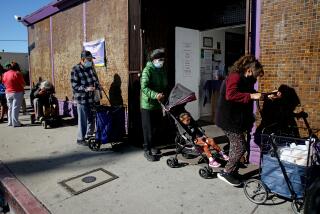Bureaucracy Seen Denying Homeless Aid
- Share via
WASHINGTON — A bureaucratic maze prevents thousands of homeless people across the nation from getting basic needed benefits such as food stamps and general welfare assistance, the U.S. Conference of Mayors said Thursday.
In meetings with officials in a number of cities, staff members of the mayors group have been told of many “Catch-22s” that make it impossible for some homeless people to get such benefits.
“Regular support for these people seems to be hard to get,” Laura Waxman, assistant executive director of the conference, said.
Problems of Mentally Ill
For example, in Connecticut, homeless mentally ill people who cannot work must have a doctor’s statement saying they are disabled to get welfare. The conference was told of similar situations in Los Angeles County.
Advocates for the homeless said that the bureaucracy is especially difficult for the mentally ill to cope with and that many sit for hours in offices waiting for help, only to leave unassisted. Others, they say, refuse to go to offices at all because they fear that they will be put in institutions.
The Agriculture Department’s food stamp program does not allow a person to receive stamps if he lives in a shelter that provides two meals a day.
Jo-Ann Eccher, director of a hunger hot line at Project Bread in Boston, said the rule is unfair because shelter meals often are not nutritious. “A homeless person is only eligible for the food stamp program if he decides to live in a car, a condemned building or on the streets,” complained Eccher, a nutritionist.
At the Agriculture Department, Jane M. Vachon, public affairs specialist, said that the regulations were set by Congress and that exceptions are made for people who provide statements from doctors saying they need a special diet that the shelter cannot provide.
Project Nationwide
The mayors group is gathering the information as part of a nationwide project designed to make it easier for its 878-member cities to cope with the problems of the homeless. The $150,000 effort is being funded by the National Institute of Mental Health.
The project will not be completed for several months, but already it has generated a debate over the rights of the homeless.
The laws are examples of how “people in emergency situations are being locked out of permanent institutional help,” said Michael Brown, spokesman for the mayors group.
However, Anna Kondratas, a senior policy analyst at the Heritage Foundation, a conservative Washington-based research organization, said, “I don’t think they should be treated any differently” from the rest of the population.
Accountability Cited
She said that “any public spending needs accountability to the public,” something that would be missing if the restrictions were removed.
James J. Preis, executive director of Mental Health Advocacy Services in Los Angeles, called the county’s rules on general relief “a barrier for the people most in need of services,” adding that because of “voluminous” paper work, many “find the system so formidable they have just given up.”
‘Doing Everything We Can’
But Eddy S. Tanaka, director of public social services for Los Angeles County, said that “we’re doing everything we can” to help homeless people in need of a share of the county’s $112 million in general relief funds. “If there is any pattern on misapplication of policies, I want to know about it,” he said.
Similarly, William Rufleth, program supervisor for Connecticut’s general assistance program, defended the state’s rules requiring the mentally ill to be categorized as “employable” or “unemployable,” saying: “I don’t think that’s a problem. I don’t see that people are disenfranchised.”
Nevertheless, an effort to revise many of the rules seems to be building in Congress.
An aide to the House Select Committee on Hunger said members are working to eliminate the “gap” between the 33 million people who need food stamps and the 19 million who receive them.
More to Read
Sign up for Essential California
The most important California stories and recommendations in your inbox every morning.
You may occasionally receive promotional content from the Los Angeles Times.










